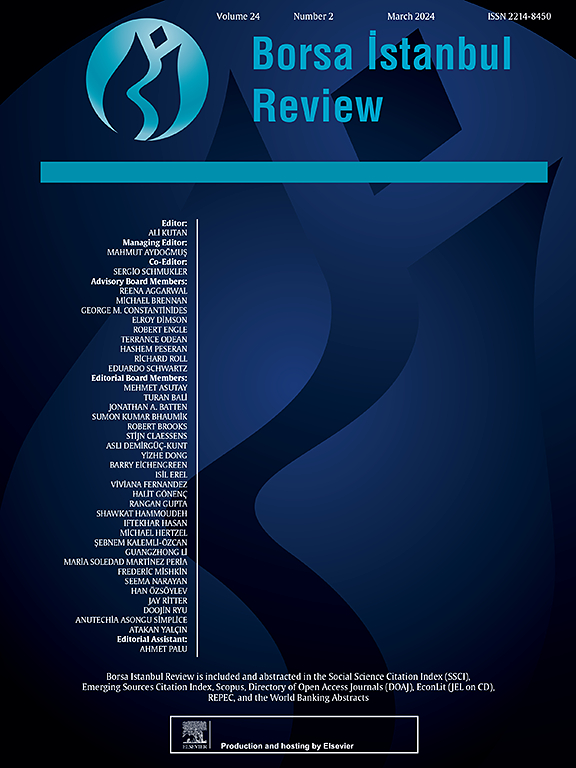金砖四国的跨境主权风险传递:揭示不对称现象和国家风险溢价的作用
IF 7.1
2区 经济学
Q1 BUSINESS, FINANCE
引用次数: 0
摘要
本研究强调了巴西、俄罗斯、印度、中国、印度尼西亚和土耳其(金砖四国)主权风险之间的非对称相互依存结构,挑战了双边贸易是跨境溢出效应主要渠道的传统观点。尽管 "金砖四国 "的能源依赖于俄罗斯的原油进口,但它们与俄罗斯之间并不存在显著的主权风险相互依存关系。研究发现,印度尼西亚的信用违约掉期(CDS)与其他国家的相互依存程度最高。由于土耳其与其他国家(尤其是印度)的信用违约掉期存在负相关,因此土耳其是最脆弱的国家。相比之下,印度因其较低的不确定性和过去十年强劲的国内生产总值增长而被视为首选投资目的地。此外,研究还强调了中国的经济影响力,中国与所有其他金砖四国的正相关关系就证明了这一点。这表明,尽管中国的主权风险较高,但投资者并不认为其他新兴市场是可行的、风险较低的替代选择。与中国相关的预期风险似乎已经超越了中国的国界,影响到其他新兴经济体的主权风险状况。本文章由计算机程序翻译,如有差异,请以英文原文为准。
Cross-border sovereign risk transmission in BRICIT Nations: Unveiling asymmetries and the role of country risk premiums
This research highlights the asymmetric interdependence structure among the sovereign risks of Brazil, Russia, India, China, Indonesia, and Türkiye (BRICIT) nations, challenging the traditional view that bilateral trade is the main channel for cross-border spillover effects. Despite their dependence on Russian crude oil imports for energy, the BRICIT nations show no significant sovereign risk interdependence with Russia. The study finds that Indonesia's credit default swap (CDS) has the highest level of interdependence with other nations. Further exploration of alternative transmission channels necessitates an examination of the country risk premium, revealing Türkiye as the most vulnerable nation due to its negative association with the CDS of other countries, particularly India. By contrast, India is identified as a preferred investment destination, thanks to its lower uncertainty and strong GDP growth over the past decade. Additionally, the research underscores China's economic influence, demonstrated by its positive association with all other BRICIT nations. This suggests that despite the high sovereign risk associated with China, investors do not view other emerging markets as viable, lower-risk alternatives. The perceived risk related to China appears to extend beyond its borders, impacting the sovereign risk profiles of other emerging economies.
求助全文
通过发布文献求助,成功后即可免费获取论文全文。
去求助
来源期刊

Borsa Istanbul Review
Multiple-
CiteScore
7.60
自引率
3.80%
发文量
130
审稿时长
26 days
期刊介绍:
Peer Review under the responsibility of Borsa İstanbul Anonim Sirketi. Borsa İstanbul Review provides a scholarly platform for empirical financial studies including but not limited to financial markets and institutions, financial economics, investor behavior, financial centers and market structures, corporate finance, recent economic and financial trends. Micro and macro data applications and comparative studies are welcome. Country coverage includes advanced, emerging and developing economies. In particular, we would like to publish empirical papers with significant policy implications and encourage submissions in the following areas: Research Topics: • Investments and Portfolio Management • Behavioral Finance • Financial Markets and Institutions • Market Microstructure • Islamic Finance • Financial Risk Management • Valuation • Capital Markets Governance • Financial Regulations
 求助内容:
求助内容: 应助结果提醒方式:
应助结果提醒方式:


